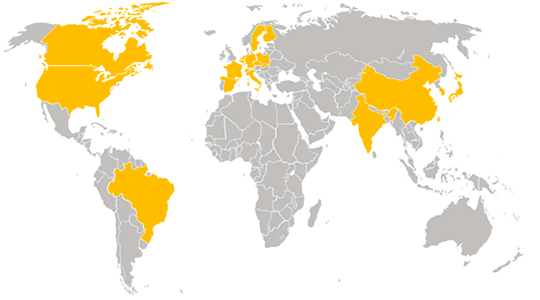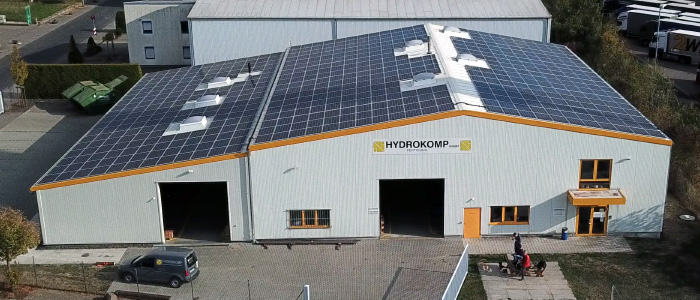General conditions of sale and supply
for products of HYDROKOMP Hydraulische Komponenten GmbH
1.1 These conditions of sale and supply shall apply exclusively. They shall also apply for all future transactions with the customer, even if they are not expressly agreed again. Any conditions on the part of the customer that conflict with or deviate from these conditions of sale shall not be recognised, unless the supplier has expressly approved of their validity in writing. These conditions of sale shall also apply in the event that the supplier carries out delivery to the customer unconditionally, being aware of conditions on the part of the customer that conflict with or deviate from these conditions of sale.
1.2 All agreements that are made between the supplier and the customer for the purpose of the execution of this contract are set out in writing in this contract. Any supple-mentary agreements and alterations require the written confirmation of the supplier. Our conditions of sale shall only apply in relation to entrepreneurs, legal entities in public law, or separate estates in public law in accordance with § 310 section 1 BGB [the German Civil Code].
2.1 The documents associated with this offer such as illustrations, drawings, specified weights and dimensions, shall only be considered approximate, in so far as they are not expressly described as binding. The supplier reserves all rights of ownership and copyright to any estimates, drawings or other documents. They must not be made available to any third party without the written consent of the supplier. The supplier shall not be entitled to make any of the customers' plans designated by the latter as confidential available to any third party without the consent of the customer. The customer is to be responsible for ensuring that any design drawings presented by him/her do not intrude upon the property rights of any third party. However, should any claims be asserted against the supplier on grounds of breach of copyright of third parties, the customer is to indemnify the supplier completely.
2.2 The written confirmation of the order by the supplier shall be definitive for the scope of supply. In the case of an offer by the supplier associated with a deadline, and timely acceptance of this offer, the offer shall be definitive in the event that no confirmation of the order arrives in time.
3.1 The prices shall apply ex works in the absence of any special agreement, including loading at the factory but excluding packaging. Value Added Tax at the appropriate statutory rate must be added to the prices.
3.2 The purchase price shall become due 30 days after the invoice date. Any deductions of discounts require special written agreement. No deduction of discount shall be permitted as long as there are any outstanding unsettled purchase price claims on the basis of older, overdue bills.
3.3 Payment instructions, cheques and discountable bills of exchange are only accepted for payment. Collection charges and any other costs shall be chargeable to the customer.
3.4 Should the customer fall into arrears with payments, the supplier shall be entitled to demand interest on arrears amounting to 8 percentage points per annum above the current base rate at the time, in accordance with § 247 of the BGB. If the supplier is in a position to prove a higher level of damages arising from payment arrears, it shall be entitled to assert these claims.
3.5 The customer shall only have the right to offset if his/her counterclaims are un-contested, have been legally confirmed, or acknowledged by the supplier. In addition to which, he/she shall be authorised to execute a right of retention to the extent that his/her counterclaim is based on the same contractual relationship.
3.6 The supplier shall retain the right to alter prices to a reasonable extent, if following conclusion of the contract any cost reductions or increases occur, particularly as a result of wage agreements or materials price changes. Evidence of these is to be demonstrated to the customer on request.
3.7 The least order value amounts net to € 50,-. Orders under this value are accepted by the supplier only provisory.
4.1 The delivery period begins with dispatch of the order confirmation, but not before the documents, approvals and authorisations to be procured by the customer are pro-duced, or before any agreed advance payment is made. Adherence to the delivery period is dependent on the fulfilment of the customer's contractual obligations.
4.2 The delivery deadline shall be deemed to have been met if the item to be delivered has left the factory by that date, or if the customer has been informed that it is ready for delivery.
4.3 The delivery period shall be extended to a reasonable extent for measures taken in the context of industrial disputes, in particular strikes and lock-outs and in the event of unforeseen obstacles that lie outside the influence of the supplier, in so far as such ob-stacles can be shown to have a significant influence on the production or dispatch of the item to be supplied. This shall also apply if these circumstances arise at the subcon-tractors'. Nor is the supplier to be held responsible for the circumstances described above if they arise in the course of an already existing delay. In important cases the supplier will inform the customer as soon as possible of the beginning and end of hindrances of this type.
4.4 If the customer incurs damages as a result of a delay that has arisen through the supplier's own fault, the customer may demand compensation for any demonstrable damages. This shall not apply in the event that the supplier is only guilty of simple or minor negligence.
4.5 If dispatch is delayed at the request of the customer, he/she shall be liable for any costs arising from storage, beginning one month after the goods are ready for delivery. In the event of storage at the supplier's premises, at least half a percent of the invoiced amount shall be charged for each month, unless the customer can show that lower costs were incurred. The supplier shall furthermore be entitled to dispose of the goods to be supplied otherwise after an appropriate deadline has been set and expired to no effect, and to supply goods to the customer within a suitably extended delivery period.
5.1 The risk shall transfer to the customer at latest on dispatch of the goods to be supplied, and indeed even if partial deliveries are made, or if the supplier has undertaken to provide other goods and services, such as carriage costs or delivery and set-up. At the request of the customer, and at his/her expense, the shipment can be insured through the supplier against theft, breakage, damage in transit, fire and water damage and other insurable risks.
5.2 If dispatch is delayed as a result of circumstances for which the customer is responsible, the risk shall transfer to the customer from the day on which the goods are ready for delivery. The supplier shall, however, be obliged to effect any insurance cover that the customer requires, at the request and expense of the latter.
5.3 Items supplied are to be accepted by the customer even if there is evidence of minor faults, regardless of the rights arising from section 7.
5.4 Partial deliveries shall be permissible.
6.1 The supplier reserves the proprietary rights to the goods supplied until all the existing claims against the customer at the time of delivery have been settled by the latter. In the case of payment by cheque or bill of exchange, the payment shall not have been completed until they have been properly cleared.
6.2 This reservation of property rights shall be extended to include all claims of the customer that the latter acquires against third parties from the resale of the goods supplied. These claims shall be assigned at the level of the gross invoiced amount. The customer shall assign these claims to the supplier as security as and when they arise. The supplier shall accept this assignment.
6.3 The customer shall not be permitted to mortgage the goods supplied, nor to make them over to third parties as security. In the event of distraint or seizure or any other pos-session proceedings by third parties, the customer is to inform the supplier immediately.
6.4 If the customer processes the goods supplied and the reserved property rights lapse as a result, this processing is to be carried out for the supplier in such a way that the supplier shall acquire proportionate joint property rights to the new item amounting to the purchase value of the goods supplied in proportion to the other goods processed at the time of processing. This processing clause shall extend to cover all claims that the customer shall in future acquire as a result of the resale of the items that are subject to this processing clause. The customer shall assign to the supplier the claims arising from the resale of this item, amounting to the value of the supplied goods processed. The supplier shall accept this assignment.
6.5 The security interests of the supplier shall not prevent the customer from utilising the goods belonging to the supplier or the claims assigned to the supplier for the purpose of security, in the normal course of business. The customer shall not be entitled to other rights of possession over the reserved goods. Normal business operations shall be deemed to have ceased if the customer falls into arrears with his/her payment obligations, if bills of exchange are disputed, if payments are stopped or if a bankruptcy application is made. In this case the customer shall be obliged at the request of the supplier to inform his/her customers of the assignment, to refrain from collecting the claim, and to permit its collection by the supplier. The customer shall be obliged to inform the supplier of the addresses of third-party customers at the first time of asking.
6.6 The supplier undertakes to release at the request of the customer securities of its own choice to which it is entitled, to the extent that the realisable value of these securities exceeds the claims to be secured by more than 20%. The realisable value of the securities is calculated as follows: Items are to be included at their current purchase price; claims are included at 80 % of their nominal value.
6.7 In the event of conduct by the customer that constitutes a breach of contract, particularly in terms of payment arrears, the supplier shall be entitled to recover goods following a reminder, and the customer shall be obliged to hand them over.
7.1 Any claims by the customer relating to faults or defects require the customer to have properly fulfilled his/her obligations according to § 377 of the HGB [German Commercial Code] in terms of examining the goods and lodging a complaint.
7.2 In so far as there is a fault or defect in the purchased item, the customer shall be entitled to have the situation remedied by means of correction of the fault, or the supply of a new item free of faults or defects. In the case of correction of faults or defects, the supplier shall be obliged to cover all expenditure required for the purpose of correcting the fault or defect, and in particular the costs of transport, travel, work done and materials used, provided that these costs are not increased by the fact that the purchased item has been moved to a location other than the place of fulfilment.
7.3 If the remedial action fails, the customer shall be entitled to demand withdrawal from the contract or a reduction in price. The right of withdrawal shall be excluded in the case of minor faults.
7.4 The supplier shall be liable in accordance with the statutory provisions in so far as the customer asserts claims for compensation that are based on intent or gross negli-gence, including the intent or gross negligence of representatives or vicarious agents of the supplier. Provided that the supplier is not charged with any intentional breach of con-tract, compensation liability shall be limited to foreseeable, typically occurring damages.
7.5 The supplier shall be liable in accordance with the statutory provisions in so far as it is guilty of breaching a fundamental contractual obligation. In this case, however, compensation liability shall be limited to foreseeable, typically occurring damage.
7.6 In so far as the customer is entitled to compensation for damage in place of the goods or services, the liability shall also be limited as in subsection 7.3 to compensation for foreseeable, typically occurring damage.
7.7 Liability for culpable injury to life and limb or health remains unaffected. This also applies to mandatory liability in accordance with the Product Liability Act.
7.8 Unless otherwise provided for in the above, all liability shall be excluded.
7.9 The limitation period for claims for faults and defects is 12 months, calculated from the date of transfer of risk.
7.10 The limitation period in the case of redress for inadequate delivery according to §§ 478, 479 BGB remains unaffected. It is five years, calculated from the date of delivery of the faulty item.
8.1 Further liability for damages going beyond the provisions of section 7 shall be excluded – irrespective of the legal nature of the asserted claim. This shall apply in parti-cular to claims for damages resulting from fault on conclusion of the contract, from other breaches of duty or from criminal claims for compensation for damage to property in accordance with § 823 BGB.
8.2 The limitation in accordance with subsection 8.1 shall also apply in do far as the customer demands the replacement of unusable applications in place of the goods or services instead making a claim for damages.
8.3 In so far as compensation liability in relation to the supplier is excluded or limited, this shall also apply with regard to the personal compensation liability of its employees, representatives and vicarious agents.
9.1 The customer may withdraw from the contract if delivery of goods and services becomes completely impossible for the supplier before transfer of risk. The customer may also withdraw from the contract if in the case of an order for items of the same type it becomes impossible to complete a part of the delivery in the numbers required, and the customer has a justified interest in rejecting a partial delivery. If this is not the case, the customer shall also be able to reduce his/her payments or services in return accordingly. If the supplier only becomes aware that the customer is in an unfavourable financial situation after the contract has been concluded, the supplier may, giving adequate notice, demand security such as is recognised in business for the payments due from the customer. If the required security is not presented to the supplier within the set period, it shall be entitled to withdraw from the contract and/or to demand compensation.
9.2 If delivery of goods and services is delayed as set out in section 4 of the conditions of supply, and if the customer grants the supplier that has fallen into arrears an appropriately extended deadline, and if this deadline is not met, then the customer shall be entitled to withdraw.
9.3 If the inability to supply occurs in the course of delayed acceptance or through the fault of the customer, the latter shall remain obliged to make payment.
9.4 Furthermore, the customer shall have a right of withdrawal if the supplier allows a reasonably extended deadline for the correction of a fault or defect for which it is res-ponsible in terns of the conditions of supply to pass to no effect through its own fault. The customer's right of withdrawal shall also apply in other cases where remedial action or the supply of a replacement by the supplier fails.
9.5 All further claims by the customer shall be excluded, and in particular for termination or price reduction, and for compensation for damages of whatever type, including for such damage as has been caused to items other than the supplied item itself. Section 7.8. shall apply accordingly.
For all disputes arising from the contractual relationship, if the customer is an entrepre-neur, a legal entity in public law or a separate estate in public law, proceedings are to be instituted at the court that has jurisdiction at the location of the supplier's the head office. The supplier shall also be entitled to institute proceedings at the location of the customer's head office.
11.1 In so far as the customer is an entrepreneur, a legal entity in public law or a separate estate in public law, the supplier's head office shall be considered the place of fulfilment.
11.2 German law shall apply for all contractual and other legal relationships between supplier and customer, to the exclusion of the UN Convention on Contracts for the International Sale of Goods.
11.3 Should any provision in these conditions of supply be or become invalid in the context of other agreements, the remaining sections shall remain binding. The parties undertake to reach an agreement in place of the invalid clause, which corresponds as closely as possible to the commercial purpose of the invalid clause.








